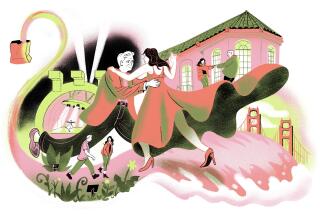Book Review : Life’s Complicated Hellos and Goodbys
- Share via
Rich in Love by Josephine Humphreys (Viking: $16.95; 265 pages)
Things would have gone more simply for Lucille Odom--not less painfully but more simply--if she had not rewritten her mother’s I’m-leaving-home note.
A teen-ager with an overdeveloped sense of responsibility for the world’s happiness, Lucille bicycles home one day and finds the groceries leaking melted ice cream on the seat of the family car. Inside the house is a breezy message addressed to her father announcing Helen Odom’s decision to start a second life.
The breeziness does not fit with Lucille’s notion of a weighty occasion. So she writes another note, more emotional, in an excellent imitation of her mother’s handwriting.
When her father comes in, he quite naturally figures that it is a fake and probably produced under compulsion. As a result, Lucille has to spend the next few weeks driving him around town--his license has been lifted for speeding--to look for her.
“Rich in Love,” witty and a trifle over compassionate, tells of a few months in which Lucille learns that life says goodby in its own way, not in hers. Also, hello and other things.
Home Leaves You
Growing up in Lucille’s civilized and permissive segment of American society no longer means leaving home. It means that home leaves you. Like Holden Caulfield’s--I do wish that boy would stop breeding--Lucille’s sense of having to preserve and care for the lives around her is a kind of panicky reach for a kingdom that is slipping away.
Right at the start, she lists the family stereotypes that so often make up an adolescent’s security. “We had my mother’s absent-mindedness, my sister’s abnormal beauty, my father’s innocence; and I was not without oddities of my own.” These were verities, these were order.
By the end, Helen Odom has convinced Lucille that bonds decay even between the loving--”We carried love to its conclusion”--and that her new independent life is a real one. Her innocent father is seriously in love with another woman. Her gifted sister struggles with a breakdown over fear of life and an unwanted pregnancy. And Lucille, having gone through a devastating passion for an older man, begins to think of the world in terms of the first and second person singular, and not of the third. She will be a player instead of a score-keeper.
Josephine Humphreys’ second novel, set in a small South Carolina town, is polished and perceptive. She brings a protagonist from member-of-the-wedding status to full-life participation with imagination and a faultless ear.
Lucille is funny and winning. The trouble is that she is too good at her adolescence. Her awkwardness is unfailingly graceful, and she has a gold-star sensibility.
Scorning her automobile-mad peers, she bicycles around her town and its surroundings, wearing a funky but prudent crash-helmet. Other teen-agers, driving by, occasionally pelt her with soft-drink cans. She explores the pockets of old-fashioned rural poverty. Beside the black farmers’ unpainted shacks, she hears the “tragic” crowing of roosters. It makes her feel “hollow and sad”; she reflects that “there is too much emotion for me in the country.”
She worries about pollution and the greenhouse effect. She goes to see her friend and would-be boyfriend, Wayne, and has him call a time-out in the kids’ baseball game he is managing, so she can ask him if he doesn’t see something amiss “in this whole design.”
She cogitates non-stop, and some of the results are endearing. Considering the frequent breakup of the endlessly active, over-programmed contemporary family, she remarks: “The human heart needs to be confined, not royally entertained, was my theory.” Drug-use is understandable; people need to get away. A system of Greyhound bus passes might do the trick, she muses.
But her bright and often touching awareness gets in the way of our own awareness of her. Certainly, we ought to be moved by her coming to terms with the transformations in her family, and by her own discovery of passion and pain. But she is so accomplished at describing and placing her feelings that they get filtered out. Her sensibility eclipses her life.
There is not a mean bone in any of the characters in “Rich in Love.” They are querulous sometimes, and sometimes silly, but they all have appealing quirks and redeeming longings. If Josephine Humphreys has written the story of a young girl passing from a narrow to a broader understanding, the effect is weakened by the exceptional understandability of everyone involved.


